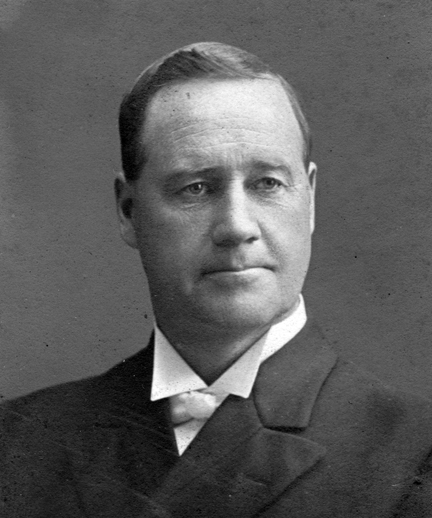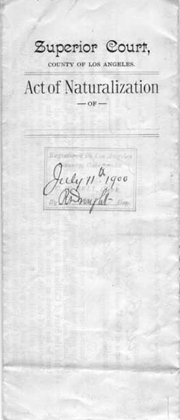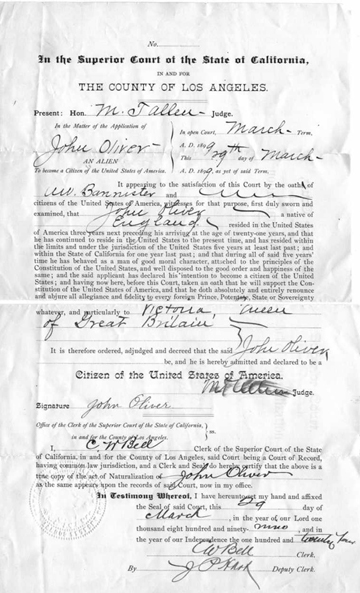 Chapter 1
Chapter 1

Reverend O

The Life of John Oliver
Written by Himself
I was born in Droitwich, Worcestershire County, England, April 1, 1865. I was the youngest son and the eighth child of Thomas and Elizabeth Oliver. I knew little of the history of my father, save that he came from somewhere in the North, and later worked in a glass factory in Manchester. The maiden name of my mother was Baxter. She was born in Worcester, the county seat. Two sisters, Alice and Sarah, were born after my birth and the three of us became a family unit. One baby, Ruth, just two years of age, died just before I was born.
Thomas and Elizabeth Oliver were religious people and conducted family worship in the home. Thomas Oliver was a Quaker, and Elizabeth belonged to the Plymouth Brethren. There being no Quaker meeting in Droitwich, nor in Leigh Sinton where the family lived, the children for the most part attended the Anglican and Methodist Churches. She was a devout and practical Christian wife and mother. She was the mother of ten children, six girls and four boys, me being the eighth child. My father was a Quaker and frequently gave expression of the evangelical passion within him by speaking on the street corners and country bridges where men gathered. I attended the Anglican Church and was baptized in it, but not confirmed because I had not been converted and had no religious experience.
Thomas Oliver was a cooper and a charcoal merchant. He would buy ten thousand cords of wood at one time, and he and two of my brothers, Enoch and William, would live in the woods while making it into charcoal. It was sold to factories and the government. I later taught myself to make furniture. I owned and ran a wood lathe quite successfully. I attended public school and at the fourth grade, I quit school and to work and help support the family. I made my living since I was fourteen years of age.
I lived the average life of an English boy of that period, going through the gang and coming to a chum relation. On account of my father, who was known throughout the city as a man of integrity, I too, was making a record along the same line. When a policeman came in on the gang one night, in a social meeting, accusing the bunch of some exploit, some with the policeman tried to tie it on to a certain boy while the whole gang kept silent, I got up and declared the truth and saved "Bert" from the charge.
One Sunday afternoon some time later, the gang got into some mischief, some of them stealing eggs from a barn. That night, Tom Small, a neighbor boy, said to me: "Jack, let's quit the gang and be chums. Some of those fellows are getting in bad." From that time Tom and I chummed together, developing our common mechanical skills, going with girls and enjoying the best in life. In eighteen months, three members of the old gang were in jail. These experiences were useful to me later in life to help boys with their problems.
We boys learned the cooper trade; and when my father went to Scotland for a three month visit with his much loved son, Thomas Paul, he put the whole cooper business in my hands though Enoch and Will were twelve and eight years older and worked at the trade. I was only seventeen years of age this when responsibility came to me, but I handled it with commendable success; and as a reward, Dad bought me a bicycle. Some few years later, I took over the whole cooper business. I also developed as a wood turner and began to make some furniture.
Coming in to manhood, at 21 I took possession of the cooper business with my father's consent, and began to pay my mother a regular amount of money for my board. The cooper business was not large, but I made a decent wage by fixing furniture and other odd jobs. But I was not satisfied and like other British sons, with the empire spread out in their thoughts, I had the ambition to travel and go some place.
The factors that entered into my final decision to come to the U.S. was that my sister Ellen corresponded with a distant cousin by marriage who was living in Illinois and she answered some of my questions as to the opportunities for a young man out there. I had been inspired by America by her responses and by the words of Capt. Mayberry of the Worcestershire County Militia, of which I was a two years a member, who said to me on several occasions "Mr. Oliver, I would like to see you go to America". Capt. Mayberry himself had gone to the U.S. and volunteered to fight in the Civil War for the freedom of the slaves.
I left England, on April 26th, 1889, sailing from Liverpool onboard the S.S. Alaska and landing in New York May 3rd. From there I took the train for Chicago and changed there for Elizabeth. I had had some idea of going to Argentina, but here I was in the U.S. headed from New York to Elizabeth, Illinois. Arriving there I was met by Mr. Billy Jones, the father of cousin Sarah. The Jones family consisted of Mr. William Jones, his wife and their daughter Sarah, a middle-aged woman. Mr. Jones was born in England. He proved to be like a father to me, for I lived in his house for over three years, and it was always "home" to me as long as I lived in Illinois. I soon began to get acquainted in the village and found the people friendly. I attended the Presbyterian Church quite regularly, of which Mr. and Mrs. Jones were members. I frequently said if that church had been more evangelistic, I would have been saved there and would probably have become a Presbyterian minister instead of a Methodist.
Being a cooper by trade, I looked around for work, but there was no cooper shop in the village of Elizabeth. Billy Jones was a plasterer and some years before had become crippled by going to sleep on a pile of wet sand and waking up with a paralyzed muscle in his right thigh, hence he was lame. He persuaded me to open up a cooper shop in Elizabeth and to make "butter tubs" for the dairymen to ship their butter. I did a good business supplying Elizabeth, Hanover and Stockton with the tubs essential to their dairying. Billy Jones and I built a workshop on his property to hold the necessary stock and machinery. Billy also signed my notes at the bank.
Two years later I opened another shop in Pearl City in the next county, the shop in Elizabeth being run by Steve Lane, a chum from England, and the one in Elizabeth run by myself. The long winters in Illinois made the dairying period short and decided to go to California, and if I did not like it there, I would go on to Australia. So I sold out my business in Pearl City and soon left for the Golden State.
My Conversion
Some time before leaving for California, a thing happened that changed my whole life. A Rev. Hinds, an Englishman and a student pastor from Northwestern University preached in the Methodist Church in Pearl City, and during a university holiday held a special revival meeting that stirred the community and won many converts.
Rev. Hinds was a good preacher and made strong thoughtful scriptural appeals to the unsaved.
Editor's note: This is where his biography leaves off. We know that he traveled to the west coast, studied at the University of Southern California for six years, and was ordained a minister in the Methodist Church. His first assignment was the new parish in Jerome, Arizona; a rugged and uncivilized copper-mining town in the high desert. This is where he met and married Dora Lulu Tovrea.






Copyright © 2018 John Oliver II
 Chapter 1
Chapter 1


 Chapter 1
Chapter 1


